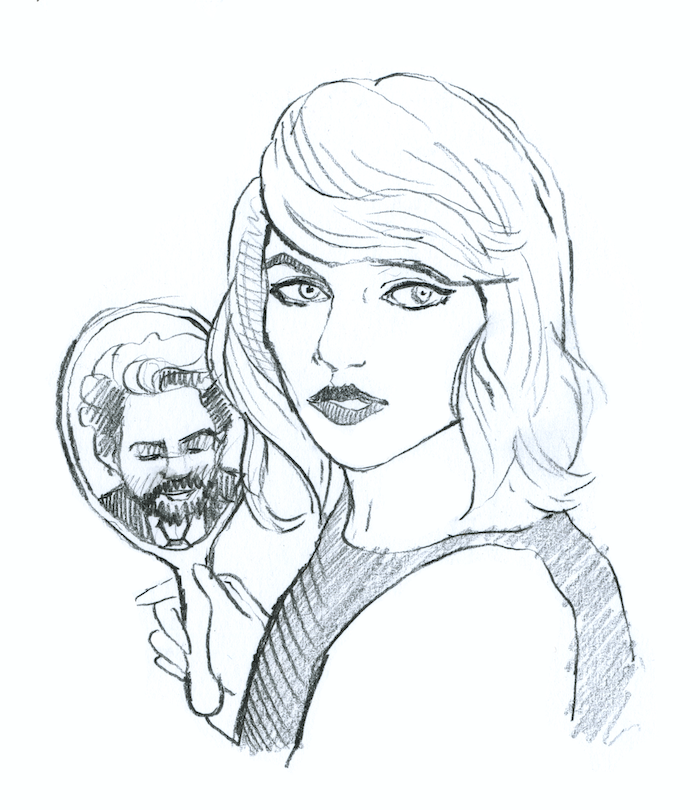
Dora Guo
The only thing harder than being a super-rich, white male is being a super-rich, white female.
Taylor Swift makes this clear in her new music video, “The Man.” While the high-budget production attempts to satirize toxic masculinity by poking fun at double-standards, it ultimately falls flat due to its reliance on overdone white feminist tropes that ignore the complex spectrum of female experience, especially for women-of-color.
Dressed up in drag reminiscent of her ex-boyfriend Jake Gyllenhaal, Swift reenacts a series of scenes from one of Leonardo DiCaprio’s wet dreams. Frat boy turned business bro, “Mr.” Swift strolls into his office, fist-pumping his coworkers, who then applaud him for no other reason than being very white, very rich, and therefore, very sexy (sounds like a Yale seminar). After work, “Mr.” Swift’s past times include: manspreading on the subway, partying on yachts with his big-tiddy Barbie doll minions and throwing $100 bills down at the strip club with his face on them (weird flex, but okay). His most unique personality trait? Lifting random children up from park benches and spinning them in the air while girls ooh and ahh, because that’s what normal people do … right?
Like her song, Swift’s message here is catchy, but simple: Men get praised for the actions women get criticized for, and that’s like, kind of yikes, guys. This ~shocking~ critique is mirrored in Swift’s lyrics: “What’s it like to brag about raking in dollars / And getting bitches and models? / And it’s all good if you’re bad / And it’s okay if you’re mad / If I was out flashing my dollars / I’d be a bitch, not a baller.” By criticizing the misogynist double-standards embedded in flex culture, Swift effectively states: I worked harder than all of y’all to get where I am, so why can’t I show off my clout, too?
While it’s awesome that Swift (and her fans) feel empowered by this call-out, even if only in a vaguely-Ariana-Grande- “thank u, next” kind of way, Swift’s critique is not really original and certainly doesn’t “smash the patriarchy” — if that even was her intention. Instead, her music video operates within the patriarchy, situating Swift, the highest-paid musician in the world, as someone oblivious, and consequently, complicit in the systematic oppression of black and brown bodies, which has allowed her to have so much money in the first place.
This obliviousness is something she has been criticized even as far back as 2015, when she called out Nicki Minaj for complaining that “Anaconda” wasn’t nominated for MTV Video of the Year Award because it celebrated black women: “@NickiMinaj I’ve done nothing but love & support you. It’s unlike you to pit women against each other. Maybe one of the men took your slot.” You’d think that five years later, there’d be some growth, right? (And no, “Mr.” Swift’s luscious beard doesn’t count.)
The most redeeming moment of “The Man” occurs when Swift drops the faux-feminist persona, and instead tackles her personal life in a 15-second long clip of “Mr.” Swift pissing on a wall. This scene is compelling not because it’s of a man pissing all over the place (I see enough of that in Yale’s bathrooms), but because of the graffiti that litters the walls — “Fearless,” “Red,” “1989,” “Speak Now,” “Reputation” — all Taylor Swift’s album titles. In the center of these titles, there is a poster: “Missing: If Found Return to Taylor Swift,” across from the sign: “No Scooters Allowed.” These signs, coupled by Swift’s album titles, allude to Swift’s ongoing feud with Scooter Braun, the music tycoon who bought out Swift’s former record label, taking ownership of her entire discography and allegedly giving Swift NO chance to negotiate or even know about the deal.
By drawing on this experience, Swift shifts a laughable performance into a vulnerable one; eliciting, at the very least, 15 seconds of empathy for the pop star, who even at the top of the music pyramid, must deal with male greed and abuse of power. And while Swift fails to acknowledge the extra hoops that women of color — such as Lizzo, Princess Nokia, Nicki Minaj and other artists — must jump through to achieve musical success, her music video “The Man,” seems like a genuine attempt to orient herself as an ally, at least when it comes to rich women getting creative ownership over their work.
(Full disclosure: I may seem like a hater, but I assure you: I will still be blasting Taylor Swift’s “Fearless” album on repeat because I have loose morals. And it’s like, okay, if it’s ironic, right?)
Kiddest Sinke | kiddest.sinke@yale.edu







